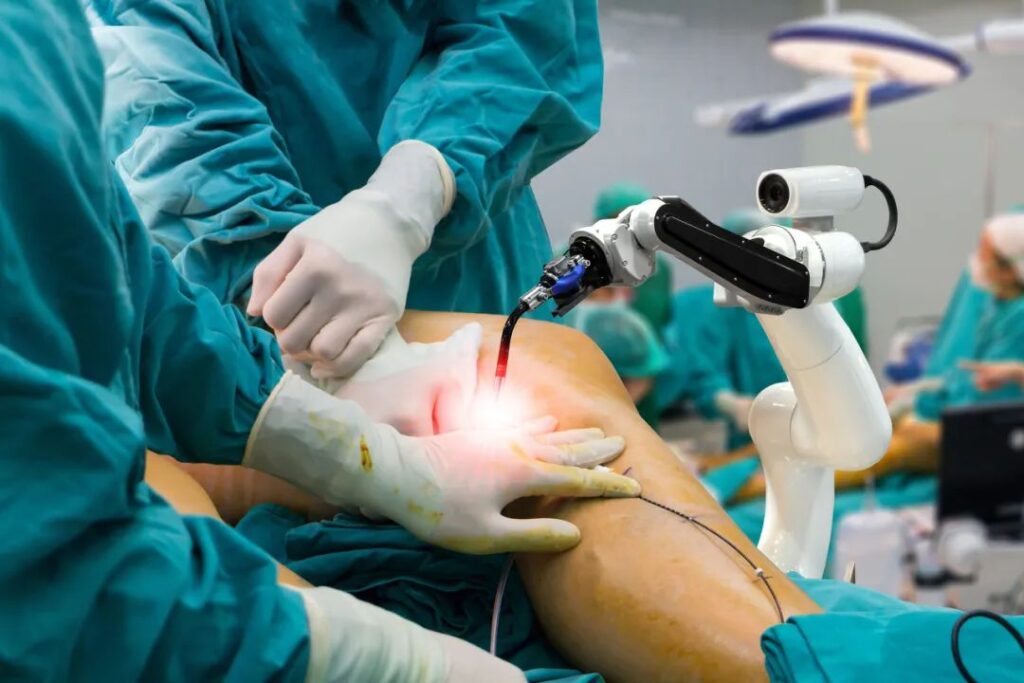Revision Total Knee Joint Replacement Surgery in Ahmedabad
Renew Your Knee, Revive Your Life
Revision Total Knee Joint Replacement
Revision total knee joint replacement is a surgical procedure to replace a failing or problematic knee implant from a previous surgery. Over time, knee implants may loosen, wear out, or develop complications like infections or fractures.
This procedure corrects these issues by replacing the old implant with a new one, restoring knee function, and alleviating pain.


Fix Implant Problems
Implant loosening, wear, misalignment, or mechanical failure can lead to instability and reduced joint function. Revision surgery addresses these issues by replacing or adjusting the existing implant.

Relieve Chronic pain
Persistent pain after a primary knee replacement can significantly impact daily life. Revision surgery helps identify and treat the root cause, offering lasting relief.

Enhance Implant Longevity
By correcting worn or failing components with advanced materials and techniques, revision surgery improves the durability and lifespan of the joint replacement.

Restore Mobility and Quality of Life
With improved joint stability and function, patients can return to daily activities with greater comfort, confidence, and improved range of motion.
Why Revision Total Knee Joint Replacement?
Revision Total Knee Joint Replacement is a specialized procedure aimed at restoring function, stability, and comfort. Here’s why it may be needed:
How Does Revision Total Knee Joint Replacement Work?
Diagnosis and Planning
Imaging tests (X-rays, CT scans) and lab tests identify the cause of implant failure.
A detailed surgical plan is created to address the specific issue.
Surgical Procedure
The old implant is carefully removed, and any damaged tissue or bone is repaired.
Bone grafts or custom implants are used to strengthen the joint.
A new implant is placed to restore functionality and stability.
Post-Surgery Recovery
Physical therapy begins early to restore strength and mobility.
Follow-up care ensures the implant performs as intended and supports long-term recovery.
Why Choose Us
Experienced Surgeons
Our team is led by highly skilled orthopedic surgeons with years of specialized experience in joint replacement and robotic-assisted procedures, ensuring expert care at every step.
Advanced Technology
We utilize the latest in robotic surgical systems and 3D imaging to deliver precise, personalized knee replacements with improved accuracy and better long-term results.
Comprehensive Care
From diagnosis to post-surgery rehabilitation, we provide end-to-end care to meet your needs ensuring a smooth, safe, and comfortable recovery journey.
Proven Track Record
With consistently successful outcomes and high patient satisfaction, our center is trusted for delivering advanced orthopedic care backed by clinical excellence.
Dedicated rehabilitation programs to ensure optimal recovery.
Have a Question?
FAQ
Knee revision surgery is typically needed when a previous total knee replacement has failed due to issues like implant loosening, infection, wear and tear, instability, or persistent pain. It may also be required if the prosthetic components become misaligned or damaged over time.
A primary knee replacement is the first-time surgical replacement of the knee joint with artificial components, usually due to severe arthritis or injury. Revision knee replacement, on the other hand, is a more complex procedure performed to correct problems from a previous knee replacement.
Recovery from a knee revision surgery typically takes longer than a primary knee replacement. Most patients begin walking with assistance within a few days post-surgery, but full recovery can take 3 to 6 months or more depending on individual health, the complexity of the procedure, and rehabilitation efforts
Signs that may indicate the need for revision knee surgery include ongoing or worsening knee pain, swelling, stiffness, instability, difficulty walking, or a noticeable change in the function of the replaced joint. In some cases, imaging tests might show implant loosening, infection, or bone loss around the prosthesis.
The timing for revision surgery depends on the severity and cause of the issue. In cases of infection, fracture, or severe implant failure, surgery may need to be performed urgently. However, if the symptoms are mild and manageable, your surgeon may monitor the condition over time before recommending revision.
